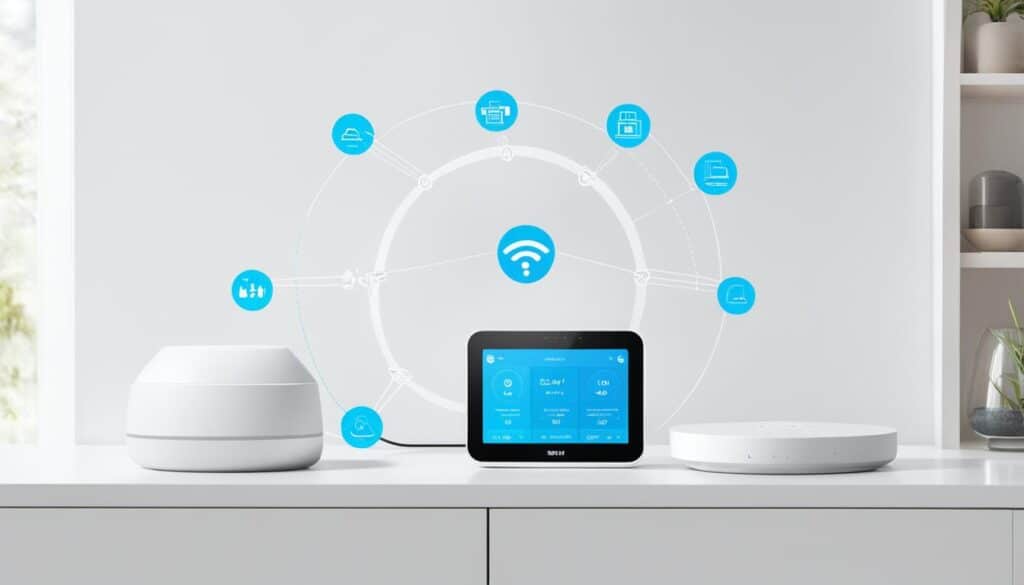Smart home technology has revolutionized the way we live, offering convenience, security, and energy efficiency at our fingertips. If you’re new to this exciting world, selecting the right smart sensors is crucial to creating a seamless and efficient smart home setup. With so many options available, it can be overwhelming to know where to start. But fear not, as I’m here to guide you through the process of choosing the best smart sensors for newbies.
Table of Contents
Key Takeaways:
- Understanding the different types of smart home sensors is essential before making a selection.
- Consider your specific smart home goals and needs to determine which sensors are essential for your setup.
- Ensure compatibility and integration with your smart home hub for seamless control and monitoring.
- Set a budget and find affordable smart home sensor options that still offer great functionality and reliability.
- Conduct thorough research and read customer reviews to make informed decisions about the sensors you choose.
Understanding the Different Types of Smart Home Sensors
Before diving into the selection process, it’s important to understand the different types of smart home sensors available. These sensors play a vital role in creating a connected and secure smart home environment. Let’s take a closer look at the various types of smart sensors:
Motion Sensors
Motion sensors detect movement and are commonly used for security purposes. They can trigger lights, alarms, or surveillance cameras when motion is detected, providing an added layer of protection to your home.
Door/Window Sensors
Door/window sensors alert you when a door or window is opened or closed. These sensors are essential for monitoring entry points and ensuring the security of your home. They can also be integrated with other smart devices to automate certain actions, such as turning off the HVAC system when a window is opened.
Temperature Sensors
Temperature sensors monitor the temperature in different areas of your home. They allow you to maintain optimal comfort levels by adjusting the heating or cooling systems accordingly. Temperature sensors are particularly beneficial for energy efficiency and can help you save on utility bills.
Humidity Sensors
Humidity sensors measure and monitor the humidity levels in your home. They are especially useful in preventing mold and mildew growth, as well as maintaining a comfortable indoor environment. Humidity sensors can work in conjunction with other devices, such as dehumidifiers or humidifiers, to maintain ideal humidity levels.
Water Leak Sensors
Water leak sensors are designed to detect water leaks or flooding in your home. Once a leak is detected, these sensors can send alerts to your smartphone, allowing you to take immediate action and prevent costly water damage. Water leak sensors are commonly placed near plumbing fixtures, appliances, or in basements.
Smoke/CO2 Detectors
Smoke and carbon monoxide (CO2) detectors are crucial for maintaining the safety of your smart home. These sensors can detect smoke, fire, or high levels of CO2, and immediately sound an alarm to alert you of any potential danger. Smoke/CO2 detectors can also be integrated with other smart devices, such as smart locks or lighting systems, to ensure a quick and safe response.
Understanding these different types of smart home sensors is essential for building a comprehensive and effective smart home system. Each sensor serves a specific purpose and contributes to enhancing the functionality and safety of your smart home setup.
Consider Your Smart Home Goals and Needs
To choose the right smart sensors for your smart home setup, it’s essential to consider your specific smart home goals and needs. What is it that you want to achieve with your smart home system? Do you prioritize security, energy efficiency, or convenience? Understanding your goals will help you determine which sensors are essential for your setup.
Security: If security is a top priority for you, consider investing in motion sensors, door/window sensors, and smoke/CO2 detectors. These sensors will help you monitor any intrusions or potential dangers in your home, giving you peace of mind and enhancing the safety of your loved ones and property.
Energy Efficiency: For those looking to optimize energy usage, temperature sensors and humidity sensors are key. These sensors can detect changes in temperature and humidity, allowing you to adjust heating, cooling, and ventilation systems accordingly. By maintaining optimal indoor conditions, you can reduce energy wastage and lower your utility bills.
Convenience: If convenience is your primary goal, smart sensors that automate daily tasks and routines will be valuable additions to your smart home. Consider sensors that can detect when you enter or leave a room, triggering the lights to turn on or off automatically. You can also invest in water leak sensors to receive instant alerts in case of any water leakage, saving you from potential damage and costly repairs.
In addition to your goals, it’s important to consider the size and layout of your home. Larger homes may require more sensors for comprehensive coverage, while smaller homes may only need a few strategically placed sensors. Identify any specific concerns or areas that you want to monitor closely, such as the basement, garage, or backyard.
By aligning your smart home goals and needs with the right sensors, you can create a personalized smart home system that caters to your unique requirements and enhances your daily life.

Compatibility and Integration with Smart Home Hub
When it comes to selecting smart sensors for your smart home setup, one crucial factor to consider is their compatibility and integration with your smart home hub. A smart home hub serves as the central control system for all your smart devices, including sensors, allowing you to manage and monitor them from a single interface.
It’s important to ensure that the sensors you choose are compatible with popular smart home hubs such as Google Home, Amazon Echo, or Apple HomeKit. This ensures seamless integration and communication between the sensors and the hub, enabling you to control and monitor them effortlessly.
Integration between your smart sensors and the hub offers several advantages. First, it allows you to collect data from different sensors in one place, providing a holistic view of your smart home’s performance and status. Second, it enables you to create automated routines and scenarios, where different sensors work together to trigger specific actions based on predefined conditions.
For example, you can set up a scenario where the motion sensor detects movement near your front door, triggering the lights to turn on and an alert to be sent to your smartphone. This level of integration enhances convenience, security, and energy efficiency in your smart home.

Checking compatibility and integration is simple. When researching sensors, refer to their product specifications or descriptions to see if they are explicitly listed as compatible with your chosen smart home hub. Additionally, you can consult customer reviews and forums to gather information about the compatibility experiences of others.
Comparison of Smart Home Hubs and Sensor Compatibility
| Smart Home Hub | Compatible Sensors |
|---|---|
| Google Home | Motion sensors, door/window sensors, temperature sensors, humidity sensors, water leak sensors, smoke/CO2 detectors |
| Amazon Echo | Motion sensors, door/window sensors, temperature sensors, humidity sensors, water leak sensors, smoke/CO2 detectors |
| Apple HomeKit | Motion sensors, door/window sensors, temperature sensors, humidity sensors, water leak sensors, smoke/CO2 detectors |
As depicted in the table above, all three popular smart home hubs—Google Home, Amazon Echo, and Apple HomeKit—are compatible with a wide range of smart sensors, covering various functionalities. This compatibility ensures that you have plenty of options to choose from while still being able to integrate them seamlessly into your smart home ecosystem.
Before making a final decision, make sure to verify the compatibility and integration aspects to have a smooth and cohesive smart home experience with your selected sensors and smart home hub.
Budget Considerations
When it comes to choosing smart home sensors, budget is an important factor to consider. Setting a spending limit will help you narrow down your options and find sensors that fit within your budget. Fortunately, there are many affordable smart home sensor options available on the market today. These sensors offer excellent functionality and reliability at a price that won’t break the bank.
When considering your budget, it’s important to strike a balance between affordability and the features and quality of the sensors you choose. Remember, the goal is to find sensors that meet your needs without compromising on performance or reliability. By carefully evaluating your budget and comparing the different options available, you can find affordable smart home sensors that will enhance your smart home system without draining your bank account.
Don’t let budget constraints deter you from creating the smart home of your dreams. With the wide range of affordable smart home sensors available, you can enjoy the convenience, security, and energy efficiency of a smart home within your budget.
| Sensor Brand | Average Price | Key Features |
|---|---|---|
| Brand A | $50 | – Motion detection – Temperature sensing – Compatibility with major smart home hubs |
| Brand B | $40 | – Door/window sensing – Easy installation – Works with virtual assistants |
| Brand C | $60 | – Water leak detection – Long battery life – Integration with security systems |
| Brand D | $45 | – Smoke/CO2 detection – Smart alerts on your smartphone – Alexa voice control |
Research and Read Reviews
Before making a final decision on which smart sensors to choose for your smart home setup, it’s crucial to conduct thorough research and read reviews to ensure that you are making informed choices. By researching and reading reviews, you can gain valuable insights into the reliability, performance, and user-friendliness of the sensors you are considering.
Customer feedback is an essential aspect of the research process. Look for reviews from customers who have already used the sensors you are interested in and pay attention to their experiences, both positive and negative. This will give you a well-rounded understanding of the pros and cons of each sensor, helping you make an informed decision that aligns with your specific needs and preferences.
Reading customer reviews can provide valuable information and potential insights that may not be apparent from a manufacturer’s marketing material. Real-life experiences can shed light on the actual performance and usability of the sensors, enabling you to make a more confident choice.
During your research, consider visiting reputable websites and forums that specialize in smart home technology. These platforms often feature comprehensive reviews, comparisons, and discussions, allowing you to gather a wide range of opinions and expert insights. Take note of any recurring themes or trends in the reviews to identify common strengths or weaknesses of the sensors.
Benefits of Researching and Reading Reviews:
- Get unbiased feedback from customers who have already used the sensors
- Gauge the reliability, performance, and user-friendliness of the sensors
- Understand the strengths and weaknesses of the sensors
- Identify recurring themes or trends in customer feedback
- Access expert opinions and insights from reputable sources
By dedicating time to research and read reviews, you can make confident decisions when selecting smart sensors for your smart home. Remember, investing time in thoroughly understanding the products you are interested in will ultimately lead to a satisfying smart home experience.
Conclusion
In conclusion, selecting the right smart home sensors for newbies is a crucial step in creating a seamless and efficient smart home setup. By understanding the different types of sensors available, considering your smart home goals and needs, ensuring compatibility with your smart home hub, budget considerations, and conducting thorough research, you can make informed decisions that align with your requirements.
Remember, starting small and gradually expanding your smart home system is a smart approach for newbies. Begin by selecting a few essential sensors that address your immediate needs, such as motion sensors or door/window sensors. As you become more familiar with the technology and understand its benefits, you can expand your setup with additional sensors that enhance your lifestyle.
By following these steps, you can create a smart home setup that not only provides convenience and security but also improves energy efficiency and overall comfort. Keep in mind that the world of smart home technology is continuously evolving, so staying updated with the latest advancements and reading customer reviews will ensure that you make informed decisions for your smart home journey. Welcome to the world of smart living!
FAQ
What are the different types of smart home sensors?
The different types of smart home sensors include motion sensors, door/window sensors, temperature sensors, humidity sensors, water leak sensors, and smoke/CO2 detectors.
How do I choose the right smart sensors for my smart home?
To choose the right smart sensors, consider your specific smart home goals and needs. Determine what you want to achieve with your smart home system and prioritize security, energy efficiency, or convenience. Also, take into account the size and layout of your home and any specific concerns or areas you want to monitor closely.
How do I ensure compatibility and integration with my smart home hub?
To ensure compatibility and integration with your smart home hub, check if the sensors you are considering are compatible with popular smart home hubs such as Google Home, Amazon Echo, or Apple HomeKit. Integration between sensors and the hub will allow you to control and monitor them seamlessly through a single interface.
How should I consider my budget when choosing smart home sensors?
Budget is an important factor to consider when choosing smart home sensors. Determine your spending limit and look for sensors that fit within your budget. Many affordable options are available that offer excellent functionality and reliability. It’s important to strike a balance between your budget and the features and quality of the sensors you choose.
How can I conduct thorough research and read reviews of smart sensors?
Before making a final decision, conduct thorough research and read reviews of the smart sensors you are considering. Look for feedback from customers who have used the sensors and pay attention to their experiences, both positive and negative. This will give you a better understanding of the reliability, performance, and user-friendliness of the sensors.


